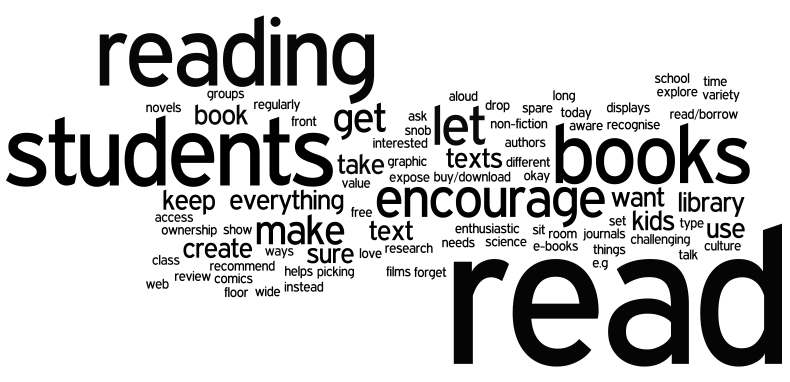
The #edread discussion continues to blossom and has now (through some pro-activity) begun to bear fruit in school. Not being one to wait for the discussion to have fully formed, I began sharing links and ideas that had been tweeted with my colleagues straight away. I also shared a reading lesson that I had completed spontaneously the other week (read the blog post about it here). Three other teacher followed my lead and did a similar lesson with their classes!
The outcome of the e-mails, sharing of links and ideas, and my constant chatter about reading resulted in a meeting between our Learning Research Centre manager (Andrea), a colleague (Jo) who has responsibility within English for Years 7 and 8 and I. The purpose? To evaluate and improve the KS3 reading program and to look into ideas that can raise the profile of reading amongst KS4 students.
I came away from the meting truly inspired – both by the range of ideas that came out of it but also by the fact that a key component in this discussion had been the resources and ideas that had been shared by my Twitter PLN. Crowdsourcing really is one of the most effective techniques to aid learning – Twitter simply makes it better by broadening the field.
From the meeting we have agreed to look in to / develop the following ideas:
For the last few years, at KS3, each class has had a weekly reading lesson. This year we introduced “shared reading” however I don’t feel that it was fully thought through. The main problem being that the books we have to use have been around for some time and are not very appealing to our students. Solution? Andrea and Jo are going to research and compile a list of books that we could purchase (probably 6 copies of each) to use in reading lessons. These are going to be new books, for different ability levels, by authors that are popular amongst 11-14 year olds; including graphic novels, comics, short stories, non-fiction texts and much more. We agreed that “shared reading” was a good idea but that it would work better if we had more appealing texts and we could break the classes up into a wider range of groups. I am sure that if we focus on variety and give the students more choice the shared reading experience will be far more effective.
This led on to a discussion about bringing the students into the LRC for their reading lessons. As I mentioned earlier a few teachers have already followed my lead with this idea. The English department used to do this regularly but it seems to have stopped happening. Andrea the LRC manager wants it to become a more regular event (not just for English either). We agreed that perhaps there should be a rota and that the students could be given a break from their “shared reading” lessons every 4/5 weeks by being brought into the LRC to explore the environment and to read whatever they want for pure pleasure.
As the meeting progressed I raised the idea of students “reviewing and recommending” books. I suggested that recommendations or new-arrivals could be displayed on the computer screens when students log-in. We also discussed setting up a LRC Blog so that Andrea could communicate with students and parents about what is happening in the LRC each term. Students could review and recommend books on it and special events could be promoted. This could be supported by more traditional methods like a notice board with reviews of books or recommendation slips stuck inside books by students when they return them after reading.
At KS4 Andrea suggested that we look at creating “reading lists” from curriculum areas. This may work for KS4 students – if they have a passion for a subject they may choose to read more about it. Wider reading is something that many of my KS5 students struggle with so introducing it at KS4 in an optional capacity may go someway to not only improving reading participation at KS4 but in turn help set expectations over reading at KS5.
We also discussed “Book Swap” which has already begun with Years 7 and 8 but I feel should be a school wide scheme. I believe that if this is done right it can significantly raise the profile of reading around the school. I am planning to do a “book-drive” to get teachers, parents and students to donate books to get the “Book Swap” off on the right foot. I also wish for the “Book Swap” events to be organised by KS4/5 students – this will hopefully generate more interest if it is being promoted by students rather than just teachers.
The final idea that we discussed was “Drop everything and read” – the idea being that the whole school, at a designated time each week, literally drops whatever they are doing and read for 20 minutes. Now, logistically this is the most challenging idea and the obvious answer (at my school) would be for this to happen during one an extended Tutor period. However, I think it would have a much bigger profile and a more significant effect if it happened during lesson time. The kids would be made to sit up and think about reading if in the middle of their Technology lesson they had to down their tools and pick up a book. I will need to get my Principal on board with this one! If anyone has any ideas about how I might convince her and the rest of the school to giving this a go please comment, e-mail me or tweet me @jamesmichie. I think this has huge potential but will take some serious willpower to get it off the ground!
The meeting was really productive and affirmed my decision to put reading at the front of my blogging / Twitter agenda. Maybe it’s the time of year – it did feel like spring this week and I really feel that the #edread discussion is beginning to take bloom.
Student involvement:
I have also now decided that I do want to get the students involved in the discussion. I particularly want to hear from KS4 students – those who do read and those who don’t. I want to understand what reading means and represents to them? Why some have continued reading for pleasure? And why other have not? I am trying to decide between using an open forum on the VLE, using the “choice” module again on the VLE or using Survey Monkey. I have decided against using Twitter as it would be difficult to get a representative response due to the fact that I have limited control over who is on Twitter and who is not. I will therefore use a method that all students can access.
The latest #edread tweets:
- AntHeald Planning tomorrow’s Y12 English Language lesson has reminded me that older kids love being read to, while sitting on the carpet too
- mccandjt: http://bit.ly/d0BlYT
- vickyloras: Talk about books regularly in class, frequent visits to the library…I’m enthusiastic about books so it’s kind of infectious!
- areaderscomm: Teacher enthusiasm, student book talks, student choice, time to read, new books in the classroom
- Loulou_Uberkirk: It’s those moments that make the tough days easier – I am bereft, we have no library in my pru.
- jamesmichie: read aloud from books you love – show your passion for reading inside the classroom – talk about it, make it a part of your students’ vocabulary.
- jamesmichie: run a book swap – encourage older students to help run it…get staff, parents & students to donate books.
- jamesmichie: http://bit.ly/cdKubt – quick reads to download. They can be read on iPod touch/iPhone.
- jamesmichie: http://bit.ly/av4SmG – find out about an author, read some of their work.
- jamesmichie: register, log-in and download some useful, fun resources:http://bit.ly/b6Fy6r.
- jamesmichie: some useful & interesting approaches here: http://bit.ly/bSodoK.
- jamesmichie: find out what your students’ passions are – get them to read about them in class – GCSE kids especially!
- jamesmichie: get your school librarian to order books that can be used as class readers / for reading groups – pick modern teenage texts! E.G.: Vampire Diaries.
- mccandjt: * B O O K W I N K * Video Booktalks for Kids, Teachers and Librarians: http://bookwink.com/ via @addthis
- jamesmichie: RT @mrstucke: Anyone got any good examples of school library websites / blogs? Thank you in advance lovely people.
- areaderscomm: I think thoughts about how we can create a culture of reading – http://bit.ly/9t1DKR
- areaderscomm: 33 graphic novels for reluctant readers by age level: http://bit.ly/d43U5G (@LibraryJournal)
- TheEngTeacher: Comic Books Hailed as New Education Tools – Korea Times http://viigo.im/2P7O
- jamesmichie: RT @shannonmmiller: Student video ‘Gotta Keep Reading’ inspires nation http://bit.ly/bYLSdd. This is a great story.
Thanks to everyone who has contributed to the discussion so far. Remember you can see a full archive of the tweets here and there is a dedicated page here.Image by kittykatfish on Flickr.

